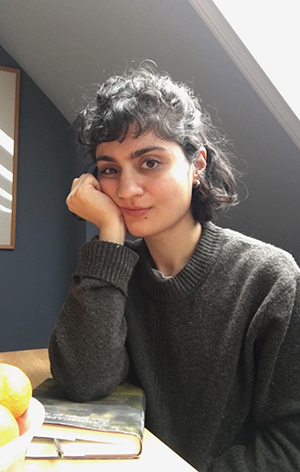How Desire Binds Us: Erin Soros in Conversation with Bahar Orang

Open Season Awards creative nonfiction judge Erin Soros talks with Bahar Orang, winner of the 2022 Open Season Creative Nonfiction Award with her essay, "You Try to Write a Love Story." They discuss the interplay between being a clinician and a creative writer, how the second person POV has the capacity to collapse time, and question whether the love story can be a site of resistance.
Bahar Orang is a writer living in Toronto. Her first book is Where Things Touch: A Meditation on Beauty.
Read what judge Erin Soros had to say about her winning essay.
You are both a clinician and a creative writer—can you describe the interplay and tensions between these roles in terms of questions, community, approach, ethics, hope?
When I was an English lit student applying to medical school, or when I was a published writer applying for residency programs—I had so many possible answers to this question. My mind was saturated with theories, takes, histories. I was basically smug with the knowledge that creative writing and the arts somehow did something good for clinical work. I could recite a lot about empathy, humility, political sensibility, openness to ambiguity. I could talk, very defensively, about how writing, for me, keeps the medical world open, porous, and interferes, or agitates where things are starting to calcify. Now…I don’t know. I’m filled with an immense apprehension. I’ve seen clinical institutions greedily swallow up and transmutate and monetize and neutralize all the things that I thought creative writing or the arts could make possible. I am letting go of any belief I once had that poetry, art, language, contains a kind of inherent or unshakeable alternativity.
But at the level of my daily life, I know that writing is how I think. The impossible, complex, unbearably difficult dilemmas that come up through clinical work—writing is how I grapple. Poems, essays, theory. Not towards coherency, but against alienation, hopelessness, helplessness, giving up. Writing is my way in. And then there is that rare experience through writing, of tapping into a sort of wondrous clarity, a shimmering relief, that strange, brief liberating moment of the world suspended and language opening a pocket of unprecedented wisdom—the other place I feel that, on occasion, is in the clinic, with the person sitting in front of me, through our conversations, through our intimacies—a real connectedness with the world—I feel that through writing sometimes and I feel that in the clinic sometimes too. There’s something deeply akin there, for me.
The second person [point of view in your winning piece] has an intimacy, but also a distance, which situates the reader within fibres of power, but also speaks to any reader, even those who may not recognize their own role in inheriting and perpetuating oppression, or those who do recognize it, and yet are still included in the “you” who longs for escape. Can you speak about your choice to use “you”—its strategies and risks and its own power?
I had this idea that I wanted to write about writing a love story, but whatever I produced at first was choppy, crooked, empty, evasive—until I took up the second person, and then suddenly, it all came out in one mad, exhilarating rush. I got a bit drunk off that momentum, and the second person feels to me now like this very seductive, very exciting mode. The second person has this profoundly poetic capacity to collapse time, collapse roles (reader and writer and speakers and figures)—it just gathers everything up, and at the same time feels so urgent—maybe it's the urgency that I find so seductive. Or the erotics. It has an erotic edge at all times. Well, clearly then if it has a particular urgency and particular erotics, then it also must also have an ethics. Lots more questions, then. Who is implicated; who is excluded; who is addressed; who is forgotten. And I love what you’re pointing out, that “you” is like a pointed finger, a recognition, maybe a painful one, maybe an accusatory one, but also a compassionate one—you, whoever you are, wherever you are (recalling June Jordan’s poem “These poems”)—you’re reproducing this violence, but I know you also want to get free. The second person is really pleasurable to write with, but yes, risky too, really risky.
When I read the sentence “You believe in desire as central to political matters,” I grasped the narrator meant not just the collective desire for material revolution, but intimate desire—in the imperfect moment, for people, place, sensuous and spontaneous presence—that these too are integral to political change, a pulse. The story was teaching us this movement through the very clear structure, paragraph to paragraph, from the individual encounter with the analyst, to the reading of revolutionary texts, to the film Portrait of a Lady, the walk, where “you take in the trees, the sky, the children, your own flesh. You observe your aloneness, and your countenance to god.” Here poetry emerges, a slowness in the plot, the list in its baseness almost at the edge of language. You guide us into attention, attending, cherishing, even as you make clear we must work toward change. Can you describe your journey to this take? What teachings are you resisting, or perhaps integrating and turning?
This is that evergreen political question, isn’t it? This is that impossible problem that I’m reading every text, that I’m looking at every art, that I’m having every conversation about. How do you (we) survive this terrible place? How do we (you) transform this terrible place? It will have something to do with beauty, and for me, beauty has to do with enmeshment, intimacy, relation, and attentiveness to it all. Which certainly helps with our survival in the terrible place, and is also actually crucial to material revolution (to use your phrase). There is something in my essay about the unbinding of the self, the displacement of the atomistic integrated self, something about resisting that the ego should be the site of creation, or that there is some sacred interior motivating creative force, something about how desire binds us in relation, that desire (not in the classically psychoanalytic sense, but in the poetic sense, the poem’s desires, the earth’s desires, the protest’s desires) has to do with beauty, and therein lies our possibilities for survival, transformation, (for want of a better word) freedom.
When you speak of “kinship with the earth” I sense you are working through the love story far beyond the dyad of the couple. The love story “reproduces that which it attempts to escape,” and you reveal in your analysis of the film how even what appears as a different love story, perhaps something new, glimpse of connection beyond heteronormative bonds, is still made possible by the colonialism that it fails to narrate. Yet you are still stubbornly borrowing the romance story (some of its sparkle, perhaps, the chance encounter and initial unknowing?) and you open it into “a matter of becoming,” “the unfolding of time.” When I read “a love story should be an occasion of excess, for making and giving in excess of the given,” I wanted to eat the words. Here I return at a slant to my opening question: I grasp you are changing “the love story,” but you seem also to invite it to change the other stories we tell or forget to tell, the political stories, environmental stories. You seem to be nudging us to think of desire less in terms of absence, but presence, or these interplaying with some other kind of ethical relation that is not a movement toward capture or even toward a conclusion. The repetition, same and yet changed: “You cannot be emptied of being.” So let’s say I want a second date with your story: what does a love story have yet to teach us, about kinship with earth, or even with the time we share on it, the time before or after our lives, our love?
I don’t think I know! I’m playing with it, that the love story is one hegemonic narrative that encloses us, badly, and that through its explosion, but not through its total eradication (because I do think a lot is possible between people), we can get at a radical difference in how we live our lives on this earth. But I don’t know if that’s really true! Can the love story be a site of resistance? We have our diversity politics that have made some unsatisfying proposals in this regard, but those are not the terms I’m thinking with here. In my essay I’m refracting the love story through all these different settings, experimenting to see what might happen in each encounter, encounters that each hold the possibility of love and of loving, and knowing, insisting, all the while that yes, exactly what you’re saying, yes—that desire has to do with presence rather than absence, but we have projected a vision of the world where desire is lack! That our conditions of living and of relating have to do with the lacking! And this theory of humanity has been used to explain and justify a natural order of things that produces so much violence, abandonment, cruelty, injustice. What if we knew a kind of desire that had to do with excess, with repair, with what can be held by the hands—is this a posture that would make better worlds possible? I don’t know!

Erin Soros
* * * * * * * *









